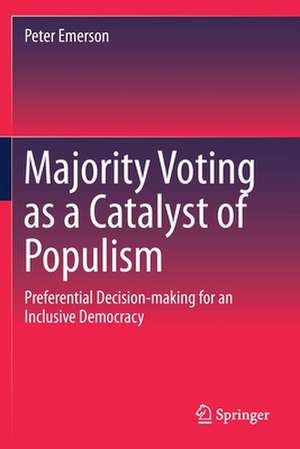Majority Voting as a Catalyst of Populism: Preferential Decision-making for an Inclusive Democracy
Autor Peter Emersonen Limba Engleză Paperback – 8 oct 2020
This timely book presents a critique of binary majority rule and provides insights into why, in many instances, the outcome of a two-option ballot does not accurately reflect the will of the people. Based on the author's first-hand experience, majority-voting is argued to be a catalyst of populism and its divisive outcomes have prompted countless disputes throughout Europe and Asia. In like manner, simple majority rule is seen as a cause of conflict in war zones, and of dysfunction in so-called stable democracies. In order to safeguard democracy, an all-party power-sharing approach is proposed, which would make populism less attractive to voters and governments alike. In geographically arranged chapters, well-tested alternative voting procedures (e. g. non-majoritarian Modified Borda Count) are presented in case studies of Northern Ireland, Central Europe, the Balkans, the Caucasus, Russia, China, North Korea and Mongolia.
| Toate formatele și edițiile | Preț | Express |
|---|---|---|
| Paperback (1) | 453.01 lei 6-8 săpt. | |
| Springer International Publishing – 8 oct 2020 | 453.01 lei 6-8 săpt. | |
| Hardback (1) | 532.38 lei 6-8 săpt. | |
| Springer International Publishing – 8 oct 2019 | 532.38 lei 6-8 săpt. |
Preț: 453.01 lei
Nou
Puncte Express: 680
Preț estimativ în valută:
86.70€ • 90.18$ • 71.57£
86.70€ • 90.18$ • 71.57£
Carte tipărită la comandă
Livrare economică 14-28 aprilie
Preluare comenzi: 021 569.72.76
Specificații
ISBN-13: 9783030202217
ISBN-10: 3030202216
Pagini: 227
Ilustrații: XXXIX, 227 p. 33 illus., 7 illus. in color.
Dimensiuni: 155 x 235 mm
Greutate: 0.38 kg
Ediția:1st ed. 2020
Editura: Springer International Publishing
Colecția Springer
Locul publicării:Cham, Switzerland
ISBN-10: 3030202216
Pagini: 227
Ilustrații: XXXIX, 227 p. 33 illus., 7 illus. in color.
Dimensiuni: 155 x 235 mm
Greutate: 0.38 kg
Ediția:1st ed. 2020
Editura: Springer International Publishing
Colecția Springer
Locul publicării:Cham, Switzerland
Cuprins
Decision-making in Parliaments and Referendums.- Parliamentary and Presidential Elections.- Governance: From Power-dividing to Power-sharing.- Majority Voting in Belfast, Dublin and London.- Continental Europe – Are We All Little Bolshevik?.- Asia, Where Voting was Invented.- Majoritarian Democracy – the Catalyst of Populism.
Recenzii
“This latest impressive book brings together his wealth of knowledge … . A key value added of his book is that he forces the reader to question foundational assumptions. … This book will be valuable for student of democratic processes, political science and conflict analysis.” (Valery Perry, democratizationpolicy.org, September 6, 2020)
Notă biografică
Peter Emerson is the director of the Belfast-based international NGO "The de Borda Institute". He has campaigned for inclusive governance since 1978. His publications include From Majority Rule to Inclusive Politics (Springer, 2016), Defining Democracy: Voting Procedures in Decision-Making, Elections and Governance (2nd ed. in 2012, Springer) and Designing an All-Inclusive Democracy: Consensual Voting Procedures for Use in Parliaments, Councils and Committees (Springer, 2007).
Textul de pe ultima copertă
This timely book presents a critique of binary majority rule and provides insights into why, in many instances, the outcome of a two-option ballot does not accurately reflect the will of the people. Based on the author's first-hand experience, majority-voting is argued to be a catalyst of populism and its divisive outcomes have prompted countless disputes throughout Europe and Asia. In like manner, simple majority rule is seen as a cause of conflict in war zones, and of dysfunction in so-called stable democracies. In order to safeguard democracy, an all-party power-sharing approach is proposed, which would make populism less attractive to voters and governments alike. In geographically arranged chapters, well-tested alternative voting procedures (e. g. non-majoritarian Modified Borda Count) are presented in case studies of Northern Ireland, Central Europe, the Balkans, the Caucasus, Russia, China, North Korea and Mongolia.
Caracteristici
Offers a critique of binary voting procedures, supported by illustrative case studies Suggests all-party power-sharing should replace all forms of single-party or majority coalition majority rule Compellingly argues that majority-rule systems tend to promote conflicts and populism
